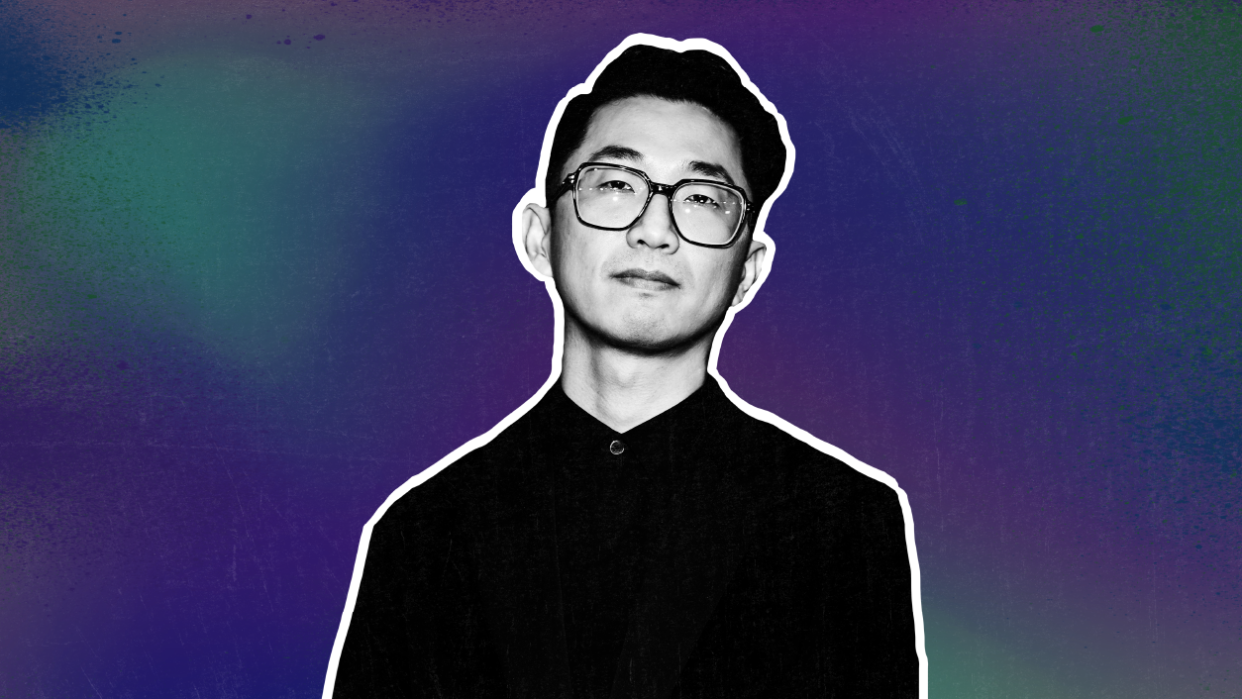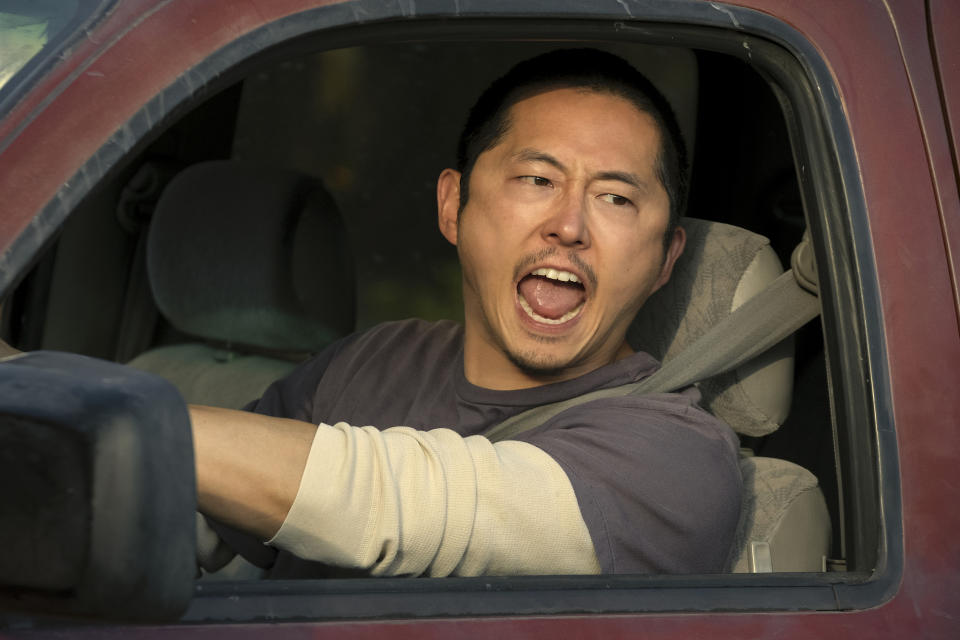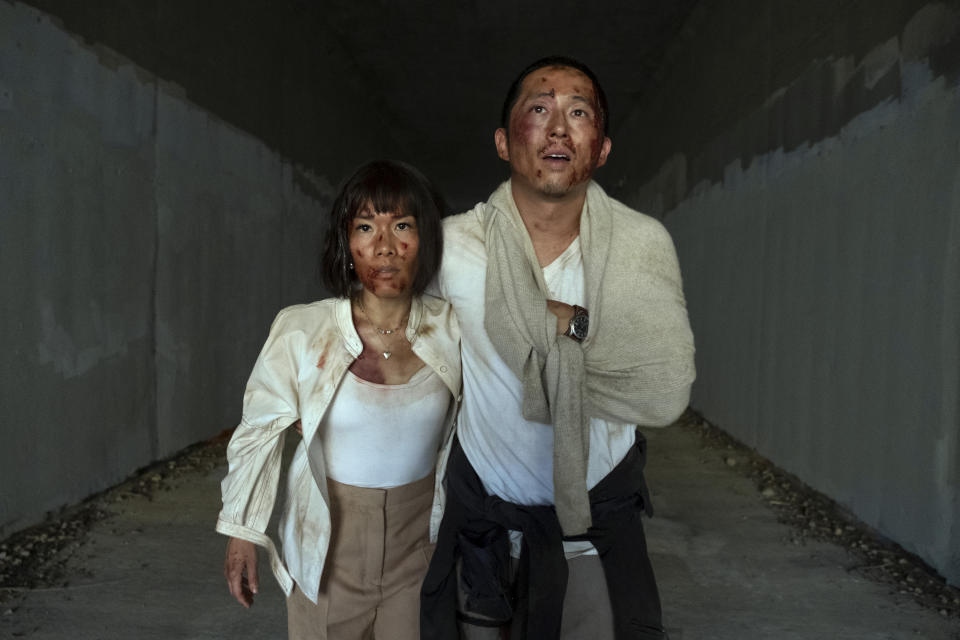‘Beef’ Creator Lee Sung Jin Breaks Down Resonance of Netflix Hit — and Best Fan Response

- Oops!Something went wrong.Please try again later.
- Oops!Something went wrong.Please try again later.

On December 6, the 2023 IndieWire Honors ceremony will celebrate 11 filmmakers, creators, and actors for their achievement in creative independence. We’re showcasing their work with new interviews leading up to the Los Angeles event.
When the time came for Lee Sung Jin to explain the tone of his dark-comedy-rage-drama “Beef” to the creative team, the writer, director, and creator of the series was very scientific.
More from IndieWire
“I tried my best to use as many words as possible to translate what was in my brain to everybody else, and I actually came up in the beginning with this very silly formula,” Lee told IndieWire over Zoom. “I said the tone of ‘Beef’ is 35 percent Paul Thomas Anderson-slash-‘Sopranos’ comedy, where you’re laughing at the broken psychology of people, plus 35 percent ‘White Lotus’ propulsion -slash-Netflix watercooler moments, plus 30 percent Ingmar Bergman-slash-Hirokazu Koreeda warm, melancholic pathos.”
“And I emailed that to everybody.”
Kicking off with a road rage incident between Amy (Ali Wong) and Danny (Steven Yeun), “Beef” does indeed hit all those hyperspecific creative notes, and the brilliance executed on screen is why Lee is the recipient of the Visionary Award for the 2023 IndieWire Honors. Ahead of the December 6 awards ceremony, Lee spoke with IndieWire about the psychology of “Beef,” his first turn as director and showrunner, and nailing that tonal formula he set out for himself.
“It was kind of a joke,” he admits of the percentage formula. “You say things like that, you pull references, but once you’re on the ground, there’s no time to really think about references. At that point, we’re always just going back to character. Even with Grace as she designs the sets, we’re talking about Amy and how she feels and and how her space could reflect that; with Danny, the lighting in his scenes, we’re talking to Larkin. It just all kept coming back to character and that naturally turned into the tone of the show. The tone does change through the episodes as well, and that was very intentional. We wanted the first episode to be a wider entrance for the audience, and then each episode we try to carefully narrow.”
“Beef” was partly inspired by a road-rage incident Lee himself experienced before the pandemic, when he was honked and yelled at by a middle-aged white man.
“In the moment I was like, ‘I am going to follow this car,'” Lee recalled. “And then we were stuck in traffic going the same way for about an hour. I think in his mind, he thought I was a lunatic following him through all of Los Angeles, and in my mind, the anger had dissipated and I was just commuting home and listening to happy music.”
Lee recognized that his brief emotional rollercoaster was “a microcosm of so much going on in our society” — a world in which minor incidents lead to major reactions. “We’re driving around in literal bubbles and projecting so much onto others, with so many assumptions, and there’s a lot going on in our own lives that add to that projection,” he said.
He shared the experience with Ravi Nandan, A24’s head of television, who encouraged Lee to flesh the moment out into a longer story. Lee immediately thought of attaching Yeun, whom he had known for years but the never quite found the right project for collaboration. Lee remembered being only a few sentences into the “Beef” pitch before, in his words, Yeun said “Yo, that’s it. That’s the one.”
As “Beef” started to coalesce in development, Lee found that reality somewhat inhibited the story he wanted to tell. He quickly scrapped the idea of casting a white man (“a Stanley Tucci-type”) opposite Yeun because of the optics. “Even in the brief time we talked about that, the ideas were becoming a little too literal and on the nose, and you have to talk about race in such an overt way and it’s not something I wanted to do at the time,” he said.
Around that time, Wong called Lee and he remembered them speaking on the phone. “Just hearing her talk about some darker things in life with such levity — she makes me laugh so easily — I just started to think, ‘Oh, there’s something here. It’d be so much more layered if she was opposite Steven.'”
Minority representation is a growing priority in Hollywood, where decades of stories featuring any character of color often focused on traumatic histories. In recent years, more emphasis has been placed on minority joy and putting these characters in situations previously enjoyed exclusively by white protagonists. “Beef” exists arguably in both spaces and neither, yanking its audience and characters between frustration, catharsis, and everything in between.
“Part of that is rage; part of it is also, for Amy especially, this deep existential sadness that she tried to speak to her husband about in Episode 3; for Paul (Young Mazino), it’s the expectations of being a younger brother,” Lee said. “So it was allowing these characters to be complicated individuals, as we all are in our real life. I think no matter where the audience’s experiences lie, they’re gonna always hopefully find something universal to relate to — not necessarily because we’re highlighting a specific part of the Asian American experience, but because people are seeing themselves in each of the characters.”

With everything coming back to character, Lee’s writers room honed in on the feeling of “the void” and how that would manifest for both Danny and Amy.
“We were trying to figure out what the core spine of the show was and the thing that I knew best was this horrible feeling in my chest that has been with me for as long as I can remember,” he said, pointing back to early conversations with Netflix and A24. “In the writers room, as we were breaking 103, I remember a day where I was talking about this feeling. I started talking about my god daughter, Lily, talking about how I really hope she never gets this feeling, and then I just started breaking down crying in the room.”
That moment of vulnerability led other writers to chime in and share similar feelings, and for the room at large to realize and lean into those sentiments. First it inspired Amy’s Episode 3 monologue, but then Lee’s team continued to chase it, haunting Danny and Amy even in the moments when they achieve what they want and expect to feel happy. Wong’s character describes feeling the ground up in her chest, which led to Lee and Jake Schreier cutting to a literal shot of the ground while editing Episode 7.
Another “North Star” as Lee describes it was the Carl Jung quote “One does not become enlightened by imagining figures of light, but by making the darkness conscious.” That came out of conversations between Lee and the “philosophical mind” of Yeun (“Some of my fondest memories of making Season 1 are the long, three-hour, four-hour conversations I would have with Steven”), who told IndieWire earlier this year that the two often identified Danny’s shame.
“[Danny and Amy] are both people who are very ashamed of the darker parts of their psyche, and they’re trying to hide it from the people that they love,” Lee said. “All their actions are to sort of protect what they see inside themselves as not worthy to be seen. It really took all these crazy events of Season 1 for them to break down their walls and basically look at each other and be like, ‘Oh, here’s the only other person who is as horrible as me and they’re still climbing into a bed and holding me at the end of the day.’ That was the main feeling that we wanted to convey through the show.”

Speaking of that bed: Lee’s first day as a director — not only on “Beef,” but ever — began in that hospital bed, with Yeun and Wong shooting the last moments of the finale while Lee directed remotely over an iPad with COVID. Thankfully he only spent one scene away from set as director, then got to lean into the role he’s been working toward for years. As a writer and producer, Lee reached out to director friends over the years, spent time breaking down and analyzing scenes, and watched Schreier, Hikari, and cinematographer Larkin Seiple all season.
“Directing is something I’ve been wanting to do for several years, but I knew that I really wanted to study it and understand it on a deep level before I even attempted it,” he said. “By the time I was directing the finale… I felt pretty confident. There were hurdles that came up, but I did — I do really love directing. It’s such a more direct reward than writing. Writing you just stare at a page and you’re not even really sure, and after you write it takes so long before you even see it come to life — whereas directing you can adjust something, see it in a monitor and be like oh that helped, or made it worse.”
Producing and writing provided helpful experience for Lee being a showrunner, but nothing can really prepare someone for wearing as many hats as he did — and many others do. He credits the rest of the production team, calling the HODs showrunners in their own right, for providing “the best, biggest training wheels one could have.
“This is why it was so important for the guild to try to get protections in our contracts to allow for more up-and-coming producer-level writers to be a part of production,” he added. “The WGA has the showrunners training program, but there really isn’t anything like actually being on the ground, and I was very fortunate to have been on the ground for some of my previous shows.
The filming schedule left a big gap between the first shot of the finale and the rest of it (Lee also completed the script while he had COVID), so that the episode was completed right at the end of the shoot.
“That was just all hands on deck,” Lee said. “We were running out of time and resources, and Larkin and I and Jake are tech scouting on our own time before after work. It was the end of the marathon and we were all running out of gas — but I think that made the shoot kind of appropriate for what the characters were going through. We were all feeling the same way and probably all very emotional by the end. I just remember that last day, I think we ended at 4:30 in the morning, and we really did feel like Danny and Amy at that point.”
As he prepares to receive his IndieWire Honors and head into a delayed awards season with the cast, Lee expressed his satisfaction at seeing the cast and crew get their flowers, as well as the resonance “Beef” still has with audiences.
“I’ve had so many people come up and say that they’ve struggled with their mental health or they’ve had suicidal ideation and just feel not as alone having seen the show,” he said. “That’s very impactful to me and it makes me not feel that way. It’s very life-affirming.”
“Beef” is currently streaming on Netflix.
Best of IndieWire
Sign up for Indiewire's Newsletter. For the latest news, follow us on Facebook, Twitter, and Instagram.

